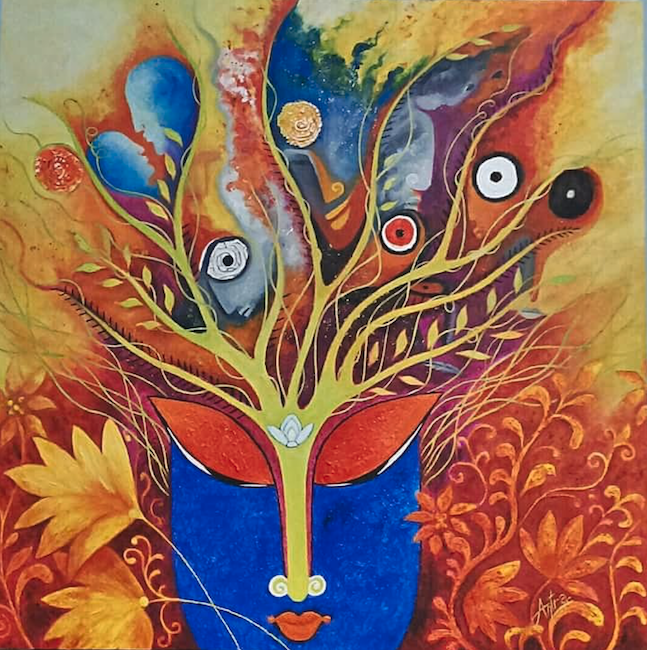We apologize that it has been a while since we last posted here. There has been a lot on our mind recently, and it has taken some time to form those thoughts into something worth writing about. You could look at this post as a further exploration of the ideas Aunty gave us in her introduction to Monism. We’d like to present it as a general theory for explaining the human condition.
This post is a bit of re-tread over ground we’ve covered before. If you already feel comfortable with the basics of this kind of philosophy, you could safely skip to part 2. We tell this story over and over and over…

A complex inspiration
We were hoping to write a follow-up to our The Rehearsal review, but episode 5 turned out to be something very different. Rather than expanding on the reality erasure that happened in Episode 4, Nathan instead gave us a much simpler theme in Episode 5: religious conflict. He tried introducing some Jewish ideology into the upbringing of their son, but the mother in training is a staunch Christian and could not accept this. In a way, this episode is our inspiration for this article but it will take a while to come back to this point.
Aunty had to go to an event early in the morning yesterday and we had to take a ride service back to our home. The driver was an elderly woman, and despite it being quite early in the morning, she was interested in conversation. She was retired, but driving 25 hours a week to keep her home against the rising costs of rent in our area, and we suppose all areas. We ended up having a deep discussion on income inequality and its increasing effect on her life through the now too common once-in-a-lifetime events our economies are seeing these days.
That conversation was also inspiration for this post. We were all fired up to write a nice piece on income inequality and how selfish ego drives that problem. As we were outlining the piece however it became more and more clear to us that selfish ego drives essentially all the problems we face in our modern world. As ego is a necessary result of Monism, we started to understand ego as being analogous to gravity in the general theory of relativity.
Why Ego?

Before we start making bold claims about the role of Ego throughout history, lets revisit why it exists at all. In this post, and on this site generally we are talking about themes and ideas that science can’t yet test. Still we hope to present enough historical evidence that with a little introspection you can see how these ideas are useful for explaining things, even if they are not yet testable.
This is how all great theories started, useful -> testable -> proven. The wave/particle nature of light was a useful theory for 100s of years before it was even testable in 1927.
In the ancient Hindu traditions there is an important philosophical concept: Maya literally meaning illusion. In this tradition we are an all powerful god that got bored from its godhood. We decided to create the world, called Samsara, and trick ourselves into existing in it. Under the illusion of Maya we split into millions of separate beings to make Samsara feel alive. As all these separate beings we are able to feel and experience the full breadth of what the universe has to offer.
This basic idea is simple enough to understand, but how does ego fit into it? Ego is what we call the impulse inside all of us to pursue and try new things. You likely do most things either on autopilot or driven by ego. To help us understand this, we should look at the opposite case, what would a person lacking an ego seem like?

The modern world has given us a few examples, we don’t have to evoke mythical beings such as the buddha. We would argue that individuals such as the Dalai Lama and Alan Watts are two such examples, although you must see them at the later points in their lives, past age 40 or so. If you watch a video of these people speaking to others you can very quickly see that there is something different there.
Enlightenment as the defeat of Ego
The thing we notice when we watch these individuals is how happy and stress free they are. These are not people who worry about paying bills at the end of the week, although certainly they had those worries being seen as leaders in their fields. Watching Mr Watts interact with somebody is very different from watching say a modern day politician do the same. Let’s run a thought experiment.
Pretend for a moment that you are very stressed out about a bill coming up, or some other problem in your life. If you don’t find a solution this problem will certainly ruin you, you are losing sleep worrying about it. So you bring this problem to your local politician, what will they say or do to help you?
If they speak with you at all it will likely be dismissive at best. Meaning they will listen to your problem but then try to use it to make themselves look good. If your problem is about billing for example, they’ll talk about all the reforms they are pushing for and if folks would just vote for them then they could fix this problem for you. They are both dismissing and also reinforcing your problem, to the politician the problem is very real — they just see it as a way to help their campaign, they have nothing to gain from helping you.
Now take this problem to Alan Watts or the Dalai Lama, or even your local buddhist abbot. You might think this is silly, but people do this all the time, monks often sit and hear the troubles of the lay people as a way to reinforce their position in that society. The enlightened person will not dismiss your problem, they will also not reinforce it. They will most likely laugh at you, but not in a mean way.

They are laughing because you have forgotten what you are, you are a god! You created this entire universe, including this problem with the bill, specifically because you wanted to experience these new feelings. That includes the feelings of despair and worry, your ego is just as interested in exploring these, this is why it keeps you up at night, it enjoys it.
So here you are, a living god who created this universe, approaching this enlightened person with this very serious problem. You have fully embraced Samsara and are taking the game completely seriously. Enlightened people do not take this reality seriously, how could they? This is the key reason they appear so happy and stress free. They’ve defeated their ego and are no longer forced to accept reality at face value.
Onto to part 2
And we should stop here for now. We’ve established a great foundation in understanding what the ego is, and what it means to be without it or enlightened. In part 2 we’ll add Monism back into this equation and present our general theory for the human condition.

Leave a Reply to Doing the Right Thing: Daughter’s ode to Sadness – Here’s Tom With The Weather Cancel reply